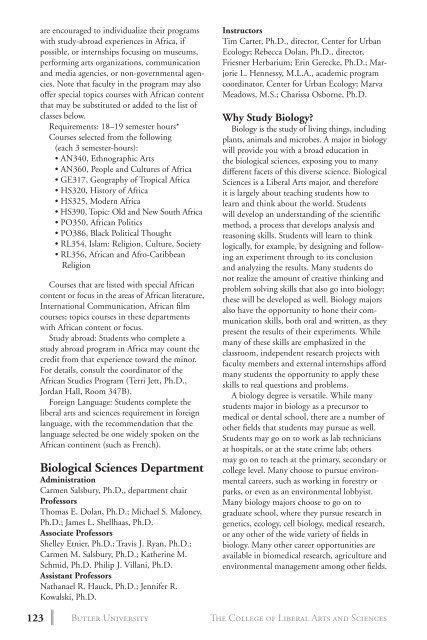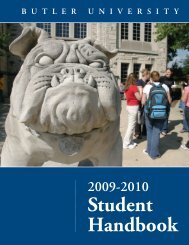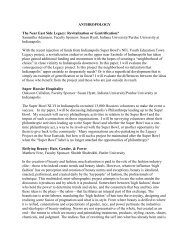2 0 1 3 bulletin - Butler University
2 0 1 3 bulletin - Butler University
2 0 1 3 bulletin - Butler University
You also want an ePaper? Increase the reach of your titles
YUMPU automatically turns print PDFs into web optimized ePapers that Google loves.
are encouraged to individualize their programs<br />
with study-abroad experiences in Africa, if<br />
possible, or internships focusing on museums,<br />
performing arts organizations, communication<br />
and media agencies, or non-governmental agencies.<br />
Note that faculty in the program may also<br />
offer special topics courses with African content<br />
that may be substituted or added to the list of<br />
classes below.<br />
Requirements: 18–19 semester hours*<br />
Courses selected from the following<br />
(each 3 semester-hours):<br />
• AN340, Ethnographic Arts<br />
• AN360, People and Cultures of Africa<br />
• GE317, Geography of Tropical Africa<br />
• HS320, History of Africa<br />
• HS325, Modern Africa<br />
• HS390, Topic: Old and New South Africa<br />
• PO350, African Politics<br />
• PO386, Black Political Thought<br />
• RL354, Islam: Religion, Culture, Society<br />
• RL356, African and Afro-Caribbean<br />
Religion<br />
Courses that are listed with special African<br />
content or focus in the areas of African literature,<br />
International Communication, African film<br />
courses; topics courses in these departments<br />
with African content or focus.<br />
Study abroad: Students who complete a<br />
study abroad program in Africa may count the<br />
credit from that experience toward the minor.<br />
For details, consult the coordinator of the<br />
African Studies Program (Terri Jett, Ph.D.,<br />
Jordan Hall, Room 347B).<br />
Foreign Language: Students complete the<br />
liberal arts and sciences requirement in foreign<br />
language, with the recommendation that the<br />
language selected be one widely spoken on the<br />
African continent (such as French).<br />
Biological Sciences Department<br />
Administration<br />
Carmen Salsbury, Ph.D., department chair<br />
Professors<br />
Thomas E. Dolan, Ph.D.; Michael S. Maloney,<br />
Ph.D.; James L. Shellhaas, Ph.D.<br />
Associate Professors<br />
Shelley Etnier, Ph.D.; Travis J. Ryan, Ph.D.;<br />
Carmen M. Salsbury, Ph.D.; Katherine M.<br />
Schmid, Ph.D. Philip J. Villani, Ph.D.<br />
Assistant Professors<br />
Nathanael R. Hauck, Ph.D.; Jennifer R.<br />
Kowalski, Ph.D.<br />
Instructors<br />
Tim Carter, Ph.D., director, Center for Urban<br />
Ecology; Rebecca Dolan, Ph.D., director,<br />
Friesner Herbarium; Erin Gerecke, Ph.D.; Marjorie<br />
L. Hennessy, M.L.A., academic program<br />
coordinator, Center for Urban Ecology; Marva<br />
Meadows, M.S.; Charissa Osborne, Ph.D.<br />
Why Study Biology?<br />
Biology is the study of living things, including<br />
plants, animals and microbes. A major in biology<br />
will provide you with a broad education in<br />
the biological sciences, exposing you to many<br />
different facets of this diverse science. Biological<br />
Sciences is a Liberal Arts major, and therefore<br />
it is largely about teaching students how to<br />
learn and think about the world. Students<br />
will develop an understanding of the scientific<br />
method, a process that develops analysis and<br />
reasoning skills. Students will learn to think<br />
logically, for example, by designing and following<br />
an experiment through to its conclusion<br />
and analyzing the results. Many students do<br />
not realize the amount of creative thinking and<br />
problem solving skills that also go into biology;<br />
these will be developed as well. Biology majors<br />
also have the opportunity to hone their communication<br />
skills, both oral and written, as they<br />
present the results of their experiments. While<br />
many of these skills are emphasized in the<br />
classroom, independent research projects with<br />
faculty members and external internships afford<br />
many students the opportunity to apply these<br />
skills to real questions and problems.<br />
A biology degree is versatile. While many<br />
students major in biology as a precursor to<br />
medical or dental school, there are a number of<br />
other fields that students may pursue as well.<br />
Students may go on to work as lab technicians<br />
at hospitals, or at the state crime lab; others<br />
may go on to teach at the primary, secondary or<br />
college level. Many choose to pursue environmental<br />
careers, such as working in forestry or<br />
parks, or even as an environmental lobbyist.<br />
Many biology majors choose to go on to<br />
graduate school, where they pursue research in<br />
genetics, ecology, cell biology, medical research,<br />
or any other of the wide variety of fields in<br />
biology. Many other career opportunities are<br />
available in biomedical research, agriculture and<br />
environmental management among other fields.<br />
123<br />
<strong>Butler</strong> <strong>University</strong><br />
The College of Liberal Arts and Sciences
















